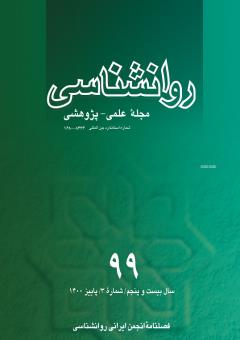رابطه هویت اخلاقی و بهزیستی هیجانی: نقش واسطه گری خودفریبی
محورهای موضوعی : روانشناسی
1 - دانشکده علوم تربیتی و روانشناسی، دانشگاه شیراز، شیراز، ایران
2 - دانشکده علوم تربیتی و روانشناسی، دانشگاه شیراز، شیراز، ایران
کلید واژه: بهزیستی هیجانی خودفریبی هویت اخلاقی,
چکیده مقاله :
هدف پژوهش حاضر بررسی نقش واسطهگری خودفریبی در ارتباط بین هویت اخلاقی و بهزیستی هیجانی بود. روش: شرکتکنندگان پژوهش 320 نفر از دانش جویان (170 زن و 150 مرد) دوره کارشناسی دانشگاه شیراز بودند که به شیوه نمونهگیری تصادفی خوشه ای انتخاب شدند و پرسشنامه های خودفریبی سیرونت و همکاران (2019)، هویت اخلاقی آکینو و رید (2002) و مقیاس بهزیستی هیجانی کی یز و مگیارموئه (2003) را تکمیل کردند. روایی و پایایی مقیاس های پژوهش با استفاده از روش تحلیل عاملی تاییدی و ضریب آلفای کرونباخ مورد بررسی و تایید قرار گرفت. به منظور بررسی فرضیههای پژوهش از روش تحلیل مسیر و نرمافزار AMOS-24 استفاده شد. یافته ها نشان دادند که مدل پژوهش با داده های جمع-آوری شده برازش مطلوبی دارد. هم چنین، نتایج نشان دهنده رابطه منفی و معنی دار ابعاد هویت اخلاقی و خودفریبی، رابطه منفی و معنی دار خودفریبی و بهزیستی هیجانی، رابطه مثبت و معنی دار درونی سازی و بهزیستی هیجانی بود. بین نمادسازی و بهزیستی هیجانی رابطه معنیداری به لحاظ آماری وجود نداشت. نقش واسطه گری خودفریبی نیز تایید گردید. در مجموع، یافتههای پژوهش حاضر بیانگر اهمیت توجه به تاثیرپذیری خودفریبی از هویت اخلاقی و اثرگذاری بر بهزیستی هیجانی دانش جویان است. نتایج بر مبنای شواهد پژوهشی و نظری مورد بحث قرار گرفته است.
The aim of this study was to investigate the mediating role of self-deception in the relationship between moral identity and emotional well-being. The participants were 320 (170 women and 150 Men) undergraduate students from Shiraz University which were selected via random cluster sampling method, and completed the self- deception questionnaire of Sirvent et al. (2019), moral identity scale of Aquino & Reed (2002), and emotional well- being scale of Keyes & Magyar-Moe (2003). The validity and reliability of the research scales were also verified by confirmatory factor analysis and Cronbach's alpha coefficient. To test the research hypothesis, path analysis were used. The findings showed that the research model fited well with the data collected. Also, the results showed a negative and statistically significant relationship between the dimensions of moral identity and self-deception, a negative and statistically significant relationship between self-deception and emotional well-being, a positive and statistically significant relationship between internalization and emotional well-being. There was no statistically significant relationship between symbolization and emotional well-being. The mediating role of self-deception was also confirmed. In general, the findings of the present study indicated the importance of paying attention to the self-deception influence of moral identity and affecting students' emotional well-being. The results are discussed based on research and theoretical evidence.
